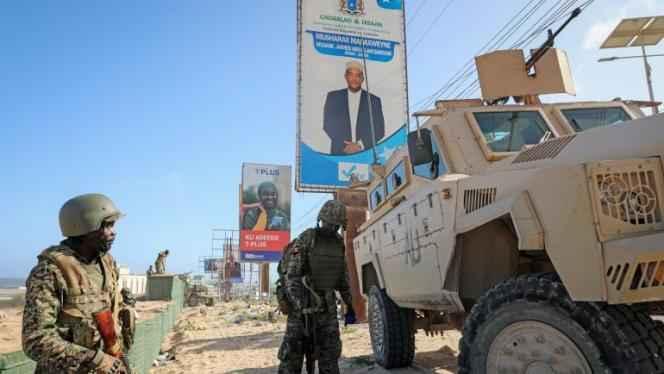Wednesday 13 November 2024
The overlooked dangers of lifting Somalia's arms embargo

The UN Security Council on 1 December 2023 voted unanimously for resolution 2714 to fully lift the three-decade arms embargo on Somalia, in a move hailed by Somalia's President Hassan Sheikh Mohamud.
"First let us remember that the embargo limited our ability to protect our citizens, enforce the rule of law, and secure our border," President Mohamud stated in a televised address following the announcement.
"It also hampered our efforts to build a capable and professional national army that can ensure the safety and wellbeing of our people."
The development followed a pledge made by Somalia in November that the Al-Qaeda-linked Al-Shabab movement would be eradicated by December 2024, after a campaign which has lasted over a year to root out the group.
It has had some success so far and has been fought alongside local militias and African Union (AU) troops, with Western backing. December 2024 is also the date by which an 18,500-strong AU peacekeeping force is due to have left the country.
History of the arms embargo on Somalia
The arms embargo was first imposed over three decades ago in 1992 in response to the eruption of the civil war in Mogadishu and the deterioration of the humanitarian situation in the south in general, which led to an ill-fated US intervention called Operation Restore Hope.
While the embargo was never very effective, the reason it was imposed in 1992 was to protect civilians from warring parties in the brutal civil war that broke out in 1991 after the long-time dictatorship of Siad Barre was overthrown. Somalia at that point had seen a breakdown in order and society was awash with weapons.
Though more stable today, the same risks remain undiminished when it comes to arms proliferation among warlords and tribal leaders in clan-dominated Somali society, a detail seemingly overlooked in the decision to lift the embargo.
The arms embargo on Somalia has passed through several stages. In June 2001, UN Security Council resolution 1356 allowed non-lethal military equipment supplies to be exempt from the ban, aiming to support the Transitional National Government (TNG) which emerged from the Somalia National Peace Conference in 2000.
As the years passed, the UNSC began partially lifting measures imposed on Somali security forces.
However, perhaps the biggest practical shift on Somalia's arms embargo was when the Intergovernmental Authority on Development (IGAD) was granted permission to deploy its forces in Somalia in 2007. This aimed to bolster the TNG in Mogadishu at the time, and arm governmental forces.
Security Council Decision 2714
Under December's Resolution 2714, the 15-strong council membership has adopted two decisions, both drafted by Britain, which has enthusiastically backed Mohamud's pledge to destroy Al-Shabab. One decision lifted the arms embargo completely from Somalia, and the other reiterated the arms embargo imposed on the Al-Qaeda-linked Al-Shabab movement.
However, according to the testimony of many international and security reports, international weapons sent to bolster the Somali government in previous years have many times fallen into the hands of Al-Shabab.
This happened when Al-Shabab had defeated government forces in battle or attacked military camps and ammunition storage depots – after which it seized the arms and ammunition available. It has also happened when corrupt troops have sold arms to Al-Shabab (as well as to civilians) – this has been an ongoing issue among both soldiers stationed in Somalia, and Somali troops themselves in the poorly-trained force.
As recently as July 2023, Al-Shabab captured a military base in the town of Geriley in Gedo region, from which Kenyan troops with the ATMIS (African Union Transition Mission in Somalia) peacekeeping forces had just withdrawn, handing it over to Somalia's military. This recent event serves to highlight the risk that the Somali military might struggle to keep hold of weaponry it will now have access to through the resolution.
Presumably for the above reasons, there was a vague attempt to acknowledge these issues in comments within Resolution 2714 which stated that while "there is no arms embargo on the Government of the Federal Republic of Somalia (GFRS)" it needed emphasising that "effective weapons and ammunition management in Somalia" would "reduce the ability of Al-Shabab, and other actors intent on undermining peace and security in Somalia and the region, to obtain weapons and ammunition".
What distinguishes the current administration from previous Somali governments is that it has pushed for the lifting of the arms embargo by tying it decisively to a call for the immediate elimination of the Al-Shabab movement.
However what needs to be reiterated is that the original aim of the arms embargo was the reduction of the power of the clan militias during the civil war, and despite the country having to some extent overcome this issue, the underlying factors that led to it still exist; perhaps more than in a long time since President Mohamud chose to start "arming the clans" as his main tactic in the state's war against Al-Shabaab in late 2022.
Ineffective
What is worth also noting in this context is that the arms embargo only ever had a limited impact on curbing local conflicts, and weapons had flowed into the country via various inlets, especially from neighbouring states, which made Somalia the arena in which they settled their own scores by proxy.
This occurred in the nineties, for example, when local Somali warlords backed by Ethiopia clashed with those backed by Egypt. Arms smuggling into Somalia also escalated with the eruption of the ferocious war between Ethiopia and Eritrea between 1998 and 2000.
These factors were behind the UN Security Council forming a UN group to monitor Somalia and Eritrea, which stated in a report in 2016 that the sources of illicit weapons smuggling into Somalia were Iran, Libya, North Korea, and Sudan.
The UN also always faced real challenges enforcing an effective arms embargo on the inflow of weapons due in part to limited resources.
Other challenges to stopping weapons flowing into Somalia related to diverging aspirations of other foreign states when it came to securing the waters off the Gulf of Aden - many maritime task forces which launched initiatives in the region had their own agendas which didn’t take Somali interests into account.
For example, foreign naval forces with military bases in Djibouti have generally turned a blind eye to arms smuggling through the Red Sea, for various reasons.
Furthermore, despite declining piracy rates off the Somali coast, the EU's decision to extend the ATLANTA operation patrolling that coast only appears concerned with piracy-related security – not with arms smuggling.
The current president Mohamud tried in his previous presidential term (2012-2016) to lift the arms embargo on the Somali government under the pretext of defeating the Al-Shabab terrorist group which has been waging a violent insurgency against the Somali government since 2006 in an attempt to establish its own rule based on a strict interpretation of Islamic law.
However, Mohamud and his successor, Mohamed Abdullahi Farmaajo, both faced firm rejection of the matter from the Security Council.
Lifting the arms embargo on Somalia may be considered a political achievement for Mohamud, who has stated that he only needs a year to purge the country of Al-Shabab, with the deadline for African Union peacekeepers to leave next year looming.
Unfortunately, however, the Security Council resolution may also result in the flow of more weapons to Al-Shabab and other local factions, if the Somali security services, which have been infiltrated by Al-Shabab (according to numerous specialist security reports) are not restructured.
Ethiopia-Somaliland Port Deal
Additionally, the recently signed and controversial Memorandum of Understanding (MoU) between Somaliland and Ethiopia on 1 January 2024 only further inflames the potential repercussions of the decision to lift the embargo, with Somali elites in Mogadishu openly advocating for a "jihad" against Ethiopia, with President Mohamud himself referring to Ethiopia as a "historical enemy".
With Al-Shabab having invested in clear rhetoric of hostility towards both Ethiopia and Somaliland, and its spokesman Ali Dheere having officially declared holy war against them, there are real fears that the group could exploit current tensions to its advantage.
Ultimately, while fighting Al Shabab is the justification that has led to the embargo lift, the fact that the powerful group has repeatedly managed to seize large stocks of weaponry before in the unstable state is the elephant in the room that has not been adequately considered.










